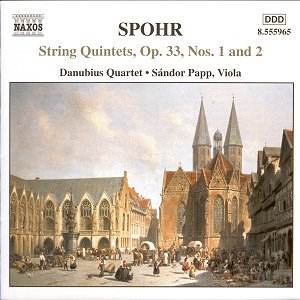Spohr’s first two Quintets were written whilst he was
orchestral director at the Theater an der Wien from 1813-15. Their genesis
was superbly pragmatic. Johann Tost, formerly a violinist, for whom
Haydn had written his Quartets Opp 54, 55 and 64 and Mozart his K593
and K614, had now retired and set up as a businessman. He asked Spohr
to compose chamber music, thirty ducats for a quartet, thirty-five for
a quintet, with Tost to retain the manuscript and to be performed only
with Tost in attendance. After three years the manuscript would be returned
to Spohr who was then free to get it published. This clandestine, labyrinthine
arrangement was devised solely in order for the wily Tost to attend
important salons where the works were performed and he could drum up
trade for his cloth business.
The Op 33 Quintets were printed in the wrong order
and No 2 was actually written first shortly after Spohr had finished
his ever-delightful Nonet and it is a work of signal accomplishment.
Clearly it is Mozartian in impulse, with four-movements lasting fully
thirty-seven minutes. The first violin part is reminiscent of the quatuor
brillant works of which Spohr was an adept exponent and is virtuosic
to a considerable degree. The opening Allegro is a fourteen-minute movement
of sophisticated developmental potential and yet it would be hard, for
all its virility and incident, not to sympathise with the admittedly
biased contemporary reviewer, Ignaz Franz von Mosel (one of whose literary
efforts had earlier aroused Spohr’s contempt) when he wrote of its "eternal
re-chewing of the theme in every voice and key." Biased he may
have been but he had a point. The Scherzo features some witty first
violin passages over accompanying strings – these are very much first
violin dominated quintets – and there is in Spohr, as so often, a coalescence
of resoluteness and humour, of a determined wit. The third movement
variations are clearly delineated with strong entry points for the individual
strings – especially the sympathetic cello writing. The finale opens
with alternating gentle and stern melodies – and then immediately a
rather stately theme enters, a quietly humorous one with harmonic variety
and some charming and highly individual stylistic features – blowsy
folk bands seem to have been en vogue at the time – leading to
a marvellously comprehensive conclusion to a multi-faceted work; not
deep but full of passing interest.
The E flat major Quintet never really attains this
level of achievement. In the Allegro there is some elegant high-lying
first violin writing over solidly underpinning support. The slow movement
makes a show of seriousness but soon gives way to good spirits whereas
the Minuet again features some virtuoso writing reminiscent of Spohr’s
contemporaneous Violin Concertos. The finale, an Allegretto, acknowledges
Spohr’s contemporary leanings as well as his historical affiliations.
There is a rather beautiful slow passage at 5’30 that reveals his ability
to surprise and distil a quixotic romantic sensibility into his scores
– and also some effortless violin virtuosity, before a benign and quiescent
ending.
The Danubius Quartet with second viola Sandor Papp
are more than worthy exponents of Spohr’s Quintets. There can be some
muddiness in the inner voices but that’s as much Spohr’s responsibility
as that of the musicians. In its aversion to easy effects or to the
innovative Spohr might be seen as a retrogressive composer but, as the
Op 33 No 2 Quintet shows, there is plenty of room for a craftsman of
lyric abundance in the chamber literature.
Jonathan Woolf


![]() See
what else is on offer
See
what else is on offer 